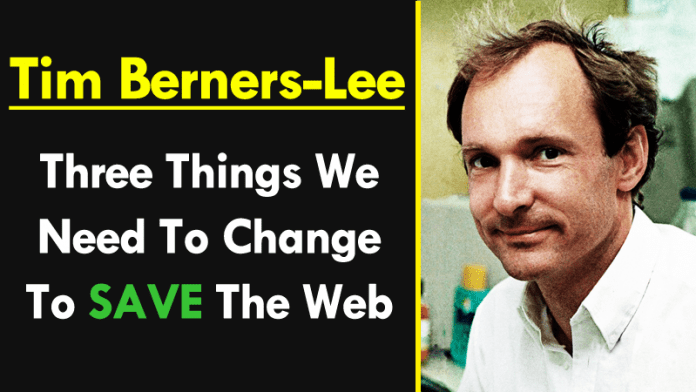Berners-Lee begins the article in the British newspaper saying he envisioned the web as an “open platform that would allow everyone and everyone to share information, access opportunities and collaborate across geographical and cultural barriers.” He believes the web has achieved this purpose but says “increasingly worried” over the past year with some tendencies that are an obstacle to the purpose he devised. Here are the three most pressing concerns of the “father of the web,” and what he suggests to solve them:-
1. The lack of control over our personal data
Do you know the terms of service that we accept without reading? Or a number of scripts they put in to collect our browsing data? Or seemingly free services, but that cost our personal data and, consequently, our privacy? Yeah. This model of exchanging our information for a free service ends up causing users to lose direct control of what they are and what they are not sharing, according to Berners-Lee. The guilt, of course, is not ours alone: he says that we often have no choice, since the terms of use offer “all or nothing.” Once with our data, companies can share with the government or use as the bargaining chip to favor certain political or economic interests. “In oppressive regimes, it is easy to see the damage done: journalists can be arrested or murdered, and political opponents can be monitored,” Berners-Lee says. He adds that even in countries where the government has good intentions, “observing anyone at any time is going too far,” since such surveillance can be a threat to freedom of expression. What to do? Berners-Lee is working with MIT on a project called Solid that modularizes his personal data and prevents companies from having access to many things at once without explicit user permission. It also suggests that subscriptions and micropayments (transactions of very low value) continue to be used as a form of revenue for newspapers and other businesses that depend on ads. Thus personal data to feed targeted marketing would be less valuable. If necessary, Berners-Lee still encourages citizens to sue the government to fight for less abusive control over personal information.
2. Fake news and misinformation on the web
False news spread quickly with ease on the web, both on behalf of who shares what reinforces their own opinions without checking the truth, and because of the algorithms of Google and Facebook that prioritize only what you want to see. This is a problematic subject by the very clear sense of truth and by the inability of algorithms and even humans to combat misinformation. What to do? Berners-Lee says we must press Facebook and Google to continue efforts to fight counterfeit news without centralizing what is or is not true. It also asks for more transparency in how the algorithms are being used to influence our life (and also our timeline).
3. Political propaganda as spam and without transparency
As we all know that to get votes, politicians make massive campaigns on the internet and hire people to come out spreading political propaganda wildly and in whatever way favors them. “Targeted ads allow a campaign to propagate completely different or conflicting speeches to various groups. Is that democratic? “Asks Berners-Lee. What to do? According to him, we need more regulations on political propaganda on the internet, just as it is regulated on TV or radio. Finally, the parent of the web admits that these problems are not simple and should be addressed with the help of companies and especially of users. He established a five-year strategy at the Web Foundation, the organization he currently works in, to delve into problems and their solutions. Did he forget something? And are these solutions plausible? Simply share your views and thoughts in the comment section below.
Δ



